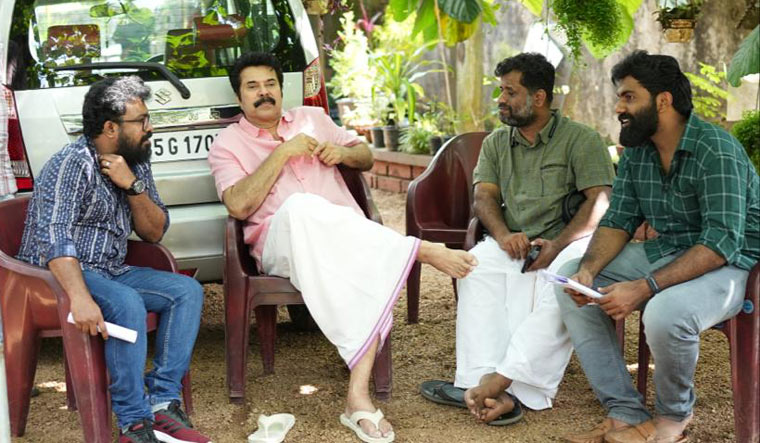Mollywood movie Kaathal-the Core was released just a day before the Bollywood film Animal, starring Ranbir Kapoor. The timing of the release of two films that are exactly opposite in their approach to masculinity was purely a coincidence. A critical look at both these movies shows how Malayalam cinema has evolved over the years to deliver movies that deal with progressive themes and content.
Mammootty-starrer Kaathal has a very simple plot, but it impressed with a very impactful story-telling. The one-liner plot of the movie sounds fairly simple—the plight of a woman stuck in a bad marriage with a closeted gay man. But the director of the movie, Jeo Baby, used much symbolism and minimal dialogues to convey the inner turmoil of characters forced to live by the rules of a society that refuses to accept them for what they are.
This wasn't, however, the first time a 'woke' issue was the subject of Malayalam cinema. There has been a trend of sorts, with arguably the most notable movie being Kumbalangi Nights, a layered drama that dealt with dysfunctional families, abandonment, mental illness, marginalisation, and the problems with patriarchy.
Then came Uyare, revolving around the story of an acid attack victim. Great Indian Kitchen highlighted the power dynamics in Indian households. A bevy of such films followed—Moothon, Puzhu, Nayattu, B 32 Muthal 44 Vare, Jaya Jaya Jaya Jaya Hey, and now Kaathal, each of them dealing with one or other socio-political issue with much finesse and subtility.
“At the time we entered the industry, the trend was changing. Since the last ten years or so, the audience has been wanting more realistic movies,” says Adarsh Sukumaran, co-writer, Kaathal. Paulson Skaria, co-writer of Kaathal, adds, “We entered at a time when a movie like Kaathal would be accepted both by the family crowd and those who want realistic cinema. People are talking about movies that are tackling unexplored topics. High budget movies needn't necessarily grab attention; the idea has to be fresh.”
“Since the audience expects to be entertained and engaged, we need to put more effort. The Malayalee audience is much evolved; they watch international movies and are very aware,” Sukumaran says. “One shouldn't make a movie for fulfilling one's social commitment; the movie should be made in a way that it reaches a wider audience,” Skaria says.
Writer-director of 19 (1)(a) Indhu V.S. feels the shift is seasonal. “Each time such a cycle emerges when there is the need for a fresh voice, fresh subjects. This has been the trend post-pandemic. People were looking for a change. So in came your formula films, along with slice-of-life, realistic movies.”
She feels the shift is also because the popularity of OTT platforms soared during the pandemic. “The audience got more exposed, more aware and watched a variety of content,” she says. Indhu feels that this has given filmmakers, writers and actors the freedom to explore more. “Everyone wants to bring in something new, something fresh; even in our society, we are talking about different topics like gender inclusivity, patriarchy, and LGBTQ rights. The new generation is more vocal and this certainly reflects in our writing.”
However, she doesn't feel that there is a shift from the superstar narrative.
Shruthi Sharanyam, director-writer of B 32 Muthal 44 Vare, feels parallel storytelling has been there in Malayalam cinema for long, but it was never part of mainstream industry. But these days it is being organically integrated into the cinematic landscape, which is great and she hopes, “our audience will be able to take it lightly, in the right way.”
“Definitely, there will be resistance from the audience when it comes to unconventional narrative. So, a nuanced approach is needed in dealing with societal issues. It cannot be blunt or didactic. One has to find a delicate balance without circumventing the core idea,” she adds. It ends up being a compromise, a lot of times, she feels.
Nashid Famy, writer, Jaya Jaya Jaya Jaya Hey, says, “I believe both scripting and movie making is a two-way process; it is a journey of continuous learning. We have to be open to criticism, and receptive to it. There will always be something to observe and learn and that helps us to come up with better cinema. About the movie Jay Jay Jay Jay Hey, I penned the script along with Vipin Das. Initially, we approached it in a serious manner. It was loud; we had a different kind of movie in mind, but the script didn't match our idea of how the film should be. We had to break it down in its entirety and change our approach.”
“Whenever I try to develop a story or screenplay, I never have the intention to educate the audience. I want the viewers to connect with the story, with the characters. I would be content if my cinema helps others to realise their ignorance; probably in a certain aspect in their life. I want the process to be organic not forced,” he adds.



